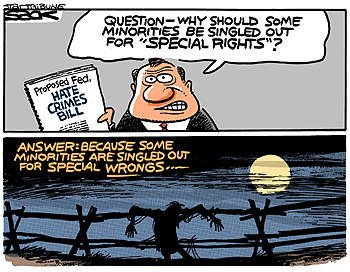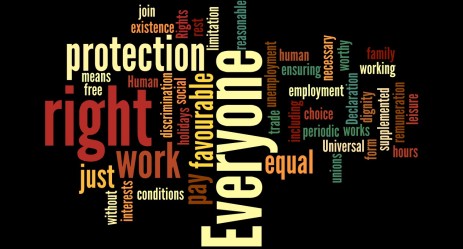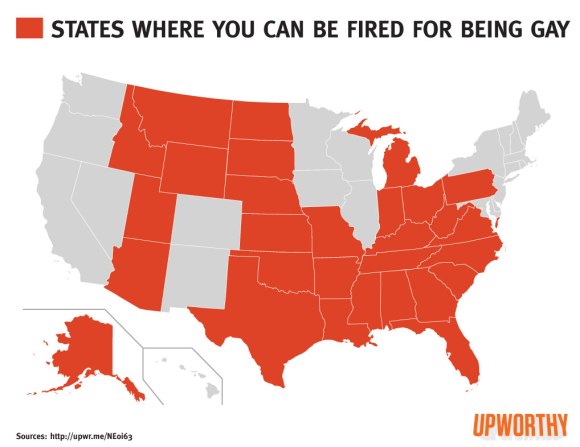The following three sources combine a mixture of theoretical, statistical and exemplary information about the current state of discrimination against LGBT individuals in the workplace. These sources help support our cause to promote to enactment of ENDA by providing a historical and political background of the issue, discussing the effects of workplace discrimination on the psychological and physical well-being of LGBT individuals, and recounting the personal stories of American citizens that have been fired due to their sexual orientation or gender identity.
1. Burdge, Barbara J. “Legal Discrimination against Lesbian, Gay, and Bisexual Employees: A Multi-Theoretical Model to Explain an Elusive Civil Rights Law.” Journal of Policy Practice 8.1 (2009): n. pag. Academic Search Premier. Web. 6 Apr. 2013.
In her article, Burdge offers a multi-theoretical approach – exploring value, historical, institutional and critical perspectives – to explain the many factors that play into the denial of workplace protections for LGB individuals. She defines this discrimination as a human rights issue that violates the equal protection of the law promised in the Universal Declaration of Human Rights. Burdge concludes that this failure to provide LGB citizens with basic workplace protections “violates core principles of justice, including equality and human dignity, as it leaves LGB persons at risk for economic deprivation and social segregation” (17).
This article is useful for our efforts to promote ENDA because it covers all of the diverse factors that are at play in workplace discrimination against LGB  individuals. For example, Burdge explores opponents’ arguments against ENDA, including those that believe ENDA would give LGBT individuals “special rights” and those that believe that LGBT individuals choose their lifestyle (14). It is important for us to understand the arguments of opponents so that we can effectively refute these arguments and frame our own arguments in a proper way.
individuals. For example, Burdge explores opponents’ arguments against ENDA, including those that believe ENDA would give LGBT individuals “special rights” and those that believe that LGBT individuals choose their lifestyle (14). It is important for us to understand the arguments of opponents so that we can effectively refute these arguments and frame our own arguments in a proper way.
Burdge references many different scholarly sources throughout her paper. One idea that she only briefly touches on in her paper is the economic effect of workplace discrimination. She references a 2004 paper by Lind called “Legislating the family: Heterosexist bias in social welfare policy frameworks” that could provide insight into these financial obstacles. Burdge briefly mentions Lind’s argument that in order for LGBT individuals to have financial success, they might have to sacrifice their identity and be willing to “pass” as straight in the workplace (6). This idea of “passing” and the need to keep identity hidden could be an interesting idea to explore further as we advocate for the passage of ENDA.
2. Gates, Trevor G. “Why Employment Discrimination Matters: Well-Being and the Queer Employee.” Journal of Workplace Rights 16.1 (2011): n. pag. Academic Search Premier. Web. 6 Apr. 2013.
In his paper, Gates discusses how workplace discrimination can harm the psychological well-being, subjective well-being and overall health of LGBT individuals. Because work is a deeply interwoven aspect of American life, Gates argues that this type of discrimination is detrimental not only financially, but psychologically and socially as well. Further, he argues that this type of discrimination constitutes a human rights violation based on Article 23 of the Universal Declaration of Human Rights which states that “[e]veryone has the right to work, to free choice of employment, to just and favourable conditions of work and to protection against unemployment” (Gates 109).
 This source will help us promote the passage of ENDA because it explains how this issue is not limited to the economic stability of LGBT citizens or the temporary effects of workplace discrimination. This problem is more serious and urgent because it can have long-lasting effects on the well-being of many LGBT citizens. Gates also explores how this issue extends farther than just instances where LGBT individuals are fired; for LGBT citizens that do remain employed, they may face long-term discrimination within the workplace if they are disregarded for promotions or face daily harassment from coworkers.
This source will help us promote the passage of ENDA because it explains how this issue is not limited to the economic stability of LGBT citizens or the temporary effects of workplace discrimination. This problem is more serious and urgent because it can have long-lasting effects on the well-being of many LGBT citizens. Gates also explores how this issue extends farther than just instances where LGBT individuals are fired; for LGBT citizens that do remain employed, they may face long-term discrimination within the workplace if they are disregarded for promotions or face daily harassment from coworkers.
Gates includes many insightful resources in his paper that might shed more light on the problems associated with employment discrimination. One source that might provide more statistical information and examples of employment discrimination is a 2007 paper by Badgett, Lau, Sears and Ho called “Bias in the workplace: Consistent evidence of sexual orientation and gender identity discrimination.”
3. Hodrick, Courtney. “5 People Who Were Fired for Being Gay, and the 29 States Where That Is Still Legal.” PolicyMic. N.p., n.d. Web. 6 Apr. 2013.
In this article, Hodrick tells the stories of five Americans from five different states across the country who were fired from their jobs for being gay or transgender. These individuals were not fired due to their job performance; rather, many of them were fired soon after revealing their sexual orientation or gender identity to an employer. All of these instances were fairly recent – between 2007 and 2012 – which shows the prevalence and urgency of this issue. Hodrick also includes a map that shows the 29 states where people can still be legally fired for being gay. The map is overwhelmingly covered in red states and shows just how widespread this problem of discrimination is.

By providing readers with personal testimonies of qualified individuals who were fired solely because of their sexual orientation or gender identity, this source offers more than just theoretical or abstract effects of workplace discrimination. This source is helpful in promoting the passage of ENDA because it gives these victims names and faces that people can relate to and understand. Readers can put themselves in the shoes of these individuals and really imagine the impact that the lack of workplace protections has on LGBT individuals.
This article links to other useful sources that go into more depth about each of the personal stories. These supplemental sources could be helpful in giving us more thorough information and background for these cases of workplace discrimination. Also, Hodrick provides a link to an article that summarizes studies about employment discrimination done by the Williams Institute on Sexual Orientation Law and Public Policy. This other article offers statistical data and scientific research to accompany these personal stories.
